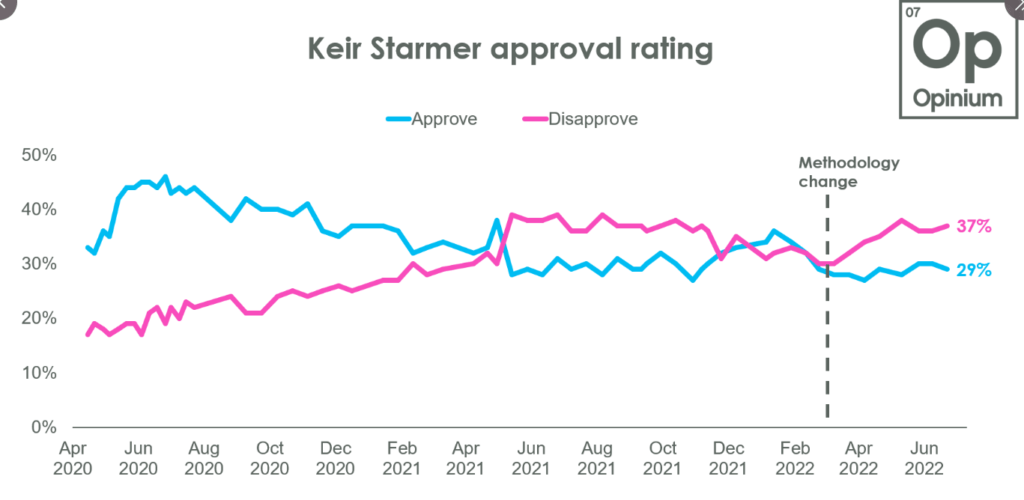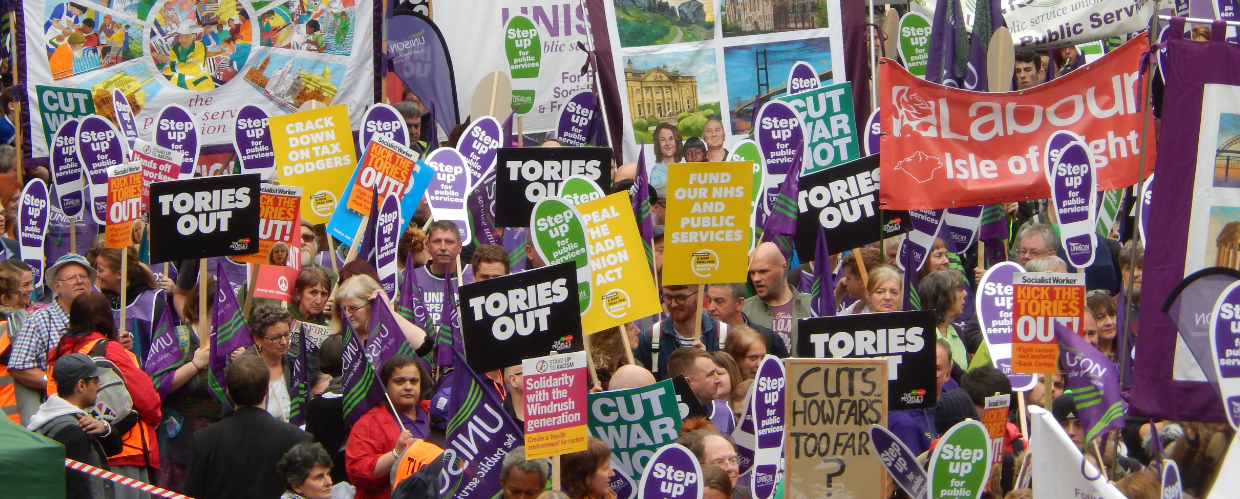There is not so much a ‘wind of change’ blowing through the organised workers’ movement at the moment as a howling gale. Faced with the biggest cuts in living standards for generations and the most inept and corrupt government in modern times, workers in their millions are taking action or preparing to take action, to defend their livelihoods.
Socialists need to appreciate the full significance of this movement because it is on a such a scale as will have a profound significance for political developments in the next few years.
Rail workers have been in the vanguard and as the RMT reports, over two thirds of the population support them. The union cites an Opinium poll which found that “70% of the public believe that rail workers should have a negotiated pay rise that takes into account the cost of living, whilst just 11% disagree.” While the Tories are proposing new laws allowing agency scab labour to break strikes, the same poll shows that “59% believe rail workers have the right to strike if negotiations fail…”
Following the RMT lead, millions of other workers are balloting or preparing to ballot to take industrial action. CWU members in Royal Mail, teachers and health workers are coming into line next. Local government workers and civil servants too, will be reluctant to accept a real-term cut in their living standards and years of enforced pay restraint. Meanwhile, university and college lecturers in the UCU are still engaged in the longest-running dispute in their history.
Threat of strikes by junior doctors
In the private sector, particularly where a strong and militant union like UNITE has led the way, some workers have won pay rises that have kept pace with inflation. At Heathrow airport this week, for example, UNITE has negotiated a massive ‘game-changing’ pay deal of 21 per cent for its some cabin crews.
What is just as remarkable is this week’s strike of barristers over the poor rates of legal aid paid to them. It is a sign of the times that barristers in silks and wigs should staff a picket line. Then there is the threat of strikes by junior doctors. These sections of (relatively) well-paid workers would have been far removed, not to say hostile, to the labour movement in the past. But today, they are explicitly following the lead set by train guards, cleaners and station staff in the RMT and for the first time ever they have directly associated themselves with the organised labour movement.
At this week’s conference of the British Medical Association, delegates from the rostrum commended the stance of other trade unionists in defence of their living standards. “Some people might think that the demand for over 30% pay restoration is too high, they might think it outrageous”, a delegate told the conference. “But I’ll tell you what’s outrageous…it is outrageous that our pay has been cut by 30%. It is outrageous that doctors today are unable to afford mortgages, and are delaying starting families, due to our falling pay.”
“Last month,” she continued, “binmen in Manchester won a 22% pay rise. Two weeks later, Gatwick Airport workers won a 21% pay rise. And in March cleaners and porters at Croydon hospital won a 24% pay rise,” noting that the ability of these workers to “collectively negotiate and collectively withdraw our labour” was instrumental. (Guardian June 28)
Mass shift in consciousness
The growing determination of workers to fight to defend their living standards will have a profound significance for the future. Although we should never underestimate the importance of providing leadership to workers in struggle, at this stage in the development of the organised working class, the mass shift in consciousness among the rank and file is a factor of decisive importance.
What is taking place is a crushing refutation of all of those faint-hearts and skeptics who argued that the labour movement since Thatcherism had been fatally weakened. In fact, although some of the ‘heavy battalions’ like the miners are no longer a force, the social weight of the working class has never been greater, in manufacturing, transport, utilities, and across all public services.

Although the numerical strength of the trade union movement is not as great as in the past, it is fast increasing, as traditional trade unions and newer unions make inroads into the gig economy, catering, cleaning and other previously unorganized sectors.
This groundswell of confidence and determination to struggle is remarkable and although at this stage, the growing militancy is reflected only in the industrial sphere, at a later stage the combativity of the working class will switch to the political plane.
What the right-wing labour leaders have never understood
What the right-wing leaders of some unions have never understood – and the right-wing leaders of the Labour Party even less so – is that they cannot stand against the tide of history and economic development. Even some lefts, abandoning the Labour Party because of the unconstitutional and organisational manoeuvres of the right wing, have failed to understand what the shift in the rank and file of the labour movement really represents.
It is an ongoing process that started before Jeremy Corbyn became leader and it is continuing today. The movement that coalesced around Corbyn from 2015 to 2019 was not a one-off event, a ’once in a lifetime’ process, but merely the first stirrings of a political giant awakening from a slumber. It was the outward form of that movement – around Corbyn himself – that was an historical accident, but not the process itself. The old mole of revolution has been burrowing away for some time, and occasionally, as we see at present, the evidence of the tunnelling is all too visible.
For all Starmer’s determination to ‘hold the line’ against strikes, insisting that MPs should not appear on RMT picket lines, the overwhelming sympathies of Labour and trade union members are in support of the rail workers. Starmer has been forced to back down from threats of sanctioning those MPs who appeared on picket lines.
The economic imperative of squeezed living standards is forcing a change in attitudes among millions of workers that was not foreseen by the right-wing, isolated as they are in the parliamentary bubble. As the by-election in Wakefield has shown, Starmer is virtually an irrelevance to the political processes at work today and it will be despite him that the Tories look like being thrown out at the next election.
If and when that happens, there will be a huge wave of expectation riding on the Labour Party, and it will be at that point that that the Keir Starmers of the Party will be swamped by a rising tide of radical demands. There is a long way to go in the development of a genuine mass movement for socialist change, but today there is every reason to be optimistic about that prospect.



